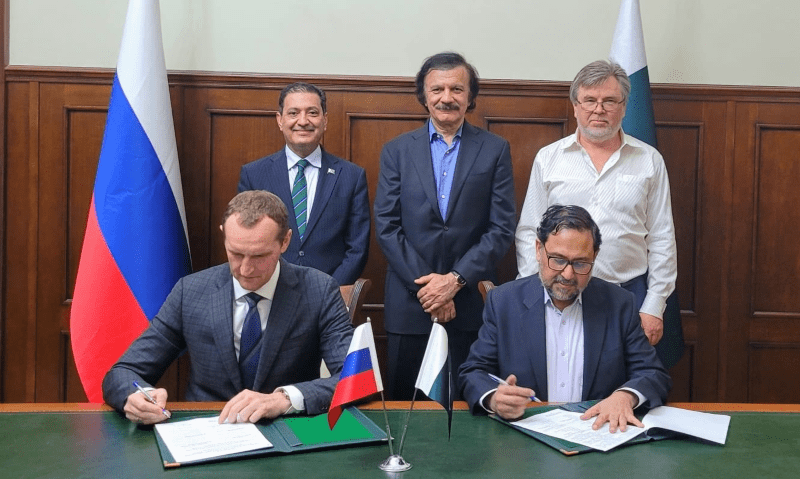The Pakistan Steel Mills (PSM). The accord was signed at the Pakistan Embassy in Moscow and is expected to usher in a new era of industrial collaboration between the two nations.
The agreement was formalized by Saif Anjum, Secretary of Industries and Production, and Vadim Velichko, General Director of Russia’s Industries Engineering LLC. The ceremony was witnessed by Special Assistant to the Prime Minister Haroon Akhtar Khan and Pakistan’s Ambassador to the Russian Federation, Muhammad Khalid Jamali.
The Pakistan Steel Mills, established 52 years ago in Karachi with Russian assistance, had long symbolized industrial strength and international collaboration. However, it ceased operations in 2015 after years of losses and mismanagement. The latest agreement not only aims to restart production but also includes provisions for expanding the facility’s capacity.
Speaking at the signing ceremony, Haroon Akhtar Khan described the agreement as a reflection of the “shared history and commitment to a stronger industrial future” between the two countries. He emphasized the strategic importance of the mill and noted that this collaboration with Russia could mark a substantial leap in Pakistan’s industrial capabilities.
The core aim of the project is to restart operations at PSM and gradually expand its production capacity, which currently stands at 1.1 to 5.0 million tonnes of steel and iron annually. This step is expected to reduce Pakistan’s reliance on steel imports and bolster local manufacturing and infrastructure development.
In addition to reviving the old facility, both countries have agreed to establish new steel mills in Karachi. The initiative was discussed in a recent meeting between Special Assistant Haroon Akhtar Khan and Russian representative Denis Nazaroof, further strengthening Pakistan-Russia industrial cooperation.
The revival of the Pakistan Steel Mills had been under consideration for several years. However, the project gained momentum following the official closure of the mill in 2024. The Sindh government subsequently reached out to Russia, seeking assistance in restoring the ageing infrastructure.
Earlier this week, a high-level Pakistani delegation led by Special Assistant on Foreign Affairs Tariq Fatemi and Haroon Akhtar Khan met with Russia’s Deputy Prime Minister Alexei Overchuk in Moscow. During the talks, Pakistani officials conveyed their high-level commitment to the steel mill project, describing it as a historic legacy of bilateral relations and a symbol of future partnership.
Haroon Akhtar Khan, also serving as the focal person for the PSM project, highlighted that the steel mill’s revival was part of a broader strategy to rebuild Pakistan’s industrial base and secure long-term strategic investments.
Notably, despite multiple efforts in the past to privatize the steel mills, the current government has excluded PSM from its privatization agenda for 2024 to 2029. Previous attempts to attract global private ownership under government-led programs failed to materialize due to structural inefficiencies and lack of investor confidence.
The latest agreement reflects a shift in policy, focusing instead on state-led revival in collaboration with international partners, particularly Russia. The decision is expected to generate employment, stimulate industrial output, and contribute to the national GDP.
The revival of Pakistan Steel Mills is not only an industrial milestone but also carries strategic significance. By engaging Russia in a long-term industrial project, Pakistan is diversifying its international partnerships beyond traditional allies. This could open new avenues for bilateral cooperation in sectors such as energy, infrastructure, and defense.
The expansion of domestic steel production is expected to reduce the trade deficit, increase export capacity, and support ongoing mega projects including those under the China-Pakistan Economic Corridor (CPEC).




